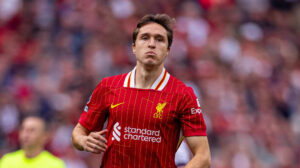
If losing the ball should be accepted and even welcome from someone, that’s wingers. That’s what Arne Slot believes. The wingers’ job is as important off the ball as on the ball, but when on it, one of their main tasks is clear: to dribble. To take on defenders. And of course, dribbling entails risks, and losses should be far more expected than by passing or retaining the ball.
Even independently of the success rate, dribbling is indispensable to intimidate the defences, to keep them on their toes and tighten the marks to generate spaces elsewhere. That said, it is also crucial that the team is prepared for whenever the dribbler loses the ball. They must be structured and properly positioned to counter-press and not be exposed in a counter-attack for every lost 1v1.
Federico Chiesa is a winger from whom a high volume of losses can be expected. Why? Because he is never conservative. He plays at full speed and his goal always is to dribble. What makes him such a good dribbler, then? That with every successful dribble he instantly generates a huge advantage for his side. He attracts defenders and his individual spark with his change of rhythm, dynamism and creativity produces chances out of nowhere.
Thankfully for him, England are built around their organisation and harmonic positioning. They can afford Chiesa losing the ball, because they have the automatisms in place to win it back soon after. They can play at a lower tempo and then know when to elevate it through a winger like Chiesa. The differential talent from the 27-year-old far outweighs the risk of his dribbling.
Leave a Reply